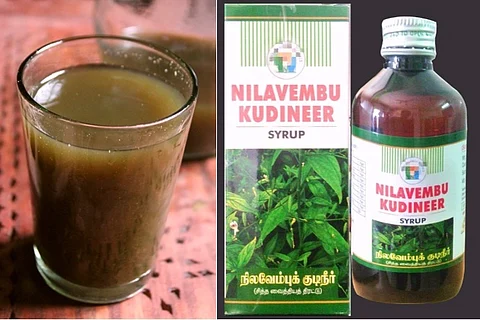

The outbreak of dengue in Tamil Nadu has the state government and the Ayush Ministry pushing nilavembu kudineer, a Siddha concoction of nine herbs, to patients and others. Extolling the benefits of the herbal concoction, the Ayush Ministry states that nilavembu kudineer is “Antipyretic (used to prevent or reduce fever), Analgesic (pain-relieving) and Anti-dengue activity proved.” The Ministry goes onto reference two studies – Anna PK ling et all, 2012 and Anbarasu, 2011 – to support its claim that nilavembu kudineer inhibits dengue and chikungunya fever.
But a report in Times of India now suggests that studies have shown that niluvembu kudineer can induce infertility.
One of the core ingredients of the niluvembu kudineer is andrographis paniculata (AP). A 2014 review published in Scientific World journal points to the infertility effect the herb has on rats. “Few studies showed the toxic effect of AP on reproductive system by damaging the Sertoli cell in male gonads in albino rats.”
The paper also indicates that past studies have shown that the plant can cause the sperm count to decrease among other effects. It also suggests to avoid the herbal drug during pregnancy “due to ovulation preventive effects of the plant.”
But infertility may not be the only risks associated with taking niluvembu kudineer.
The Memorial Sloan Kettering Cancer Centre has also investigated the properties of the nilavembu kudineer under its botanical name.
It warns against taking andrographis if one is on chemotherapy drugs – pointing out that the plant has antioxidant effects and can interfere with the action of chemo drugs.
The Cancer Centre warns patients from using the herbal concoction if one is taking blood pressure reducing drugs, stating that it has additive hypotensive effects. The plant also interferes with anticoagulants and antiplatelet drugs.
Other adverse reactions, the Cancer Centre, observes include headache, fatigue, hypersensitivity, lymphadenopathy, pain in the lymph nodes, nausea, diarrhoea, and acute kidney injury.
‘Every drug has side effects’: TN govt
Speaking to TNM, Tamil Nadu Health Secretary J Radhakrishnan pointed out that like allopathic medicines, the niluvembu kudineer also has side effects. “Every drug has side effects. We are advocating it as it has proven benefits in several countries.”
He added that the Tamil Nadu government is recommending the concoction only under a recognised Siddha medical practitioner and said niluvembu kudineer needs to be taken under the specified doses.
However, medical practitioners appear far from convinced by the effects of the alternative drug. TN Ravisankar, President of the Indian Medical Association Tamil Nadu pointed out that there is no scientific evidence to prove the government’s claims on niluvembu kudineer. “For five years, nilavembu kudineer is being used by the government. But what are its uses? We need scientific evidence for its benefits. What are its side effects? The government should carry out studies on the uses and provide scientific evidence for the same,” he told TNM.
Dr Dilip Mathai, Dean and Professor of Medicine at Apollo Institute of Medical Science and Research told ToI, “There is no proven, clinically useful anti-viral component effective against dengue.”